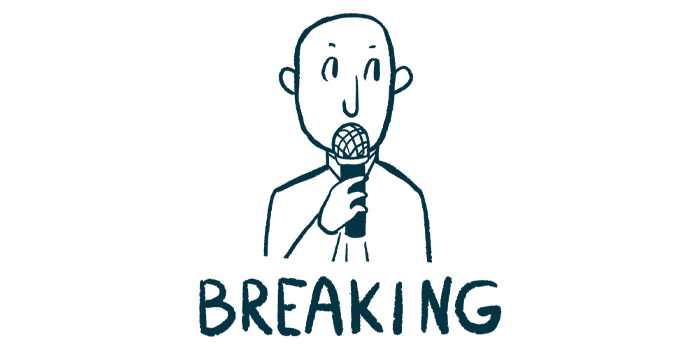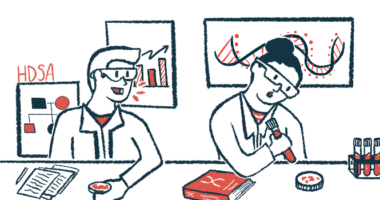Gene therapy AMT-130 slows Huntington’s progression by 75%
New trial data show one-time treatment is safe, effective over 3 years

uniQure’s experimental gene therapy AMT-130 safely and effectively slows the progression of Huntington’s disease, according to top-line, three-year data from two Phase 1/2 clinical trials.
At 36 months, the use of high-dose AMT-130 was shown to slow Huntington’s progression by 75% — results the developer called “statistically significant” and a scientist dubbed “groundbreaking” in a company press release announcing these first data.
“We are incredibly excited about these top-line results and what they may represent for individuals and families affected by Huntington’s disease,” said Walid Abi-Saab, MD, chief medical officer of uniQure. “These findings reinforce our conviction that AMT-130 has the potential to fundamentally transform the treatment landscape for Huntington’s disease, while also providing important evidence supporting one-time, precision-delivered gene therapies for the treatment of neurological disorders.”
uniQure is planning to hold a meeting with the U.S. Food and Drug Administration (FDA) later this year to discuss these results. Assuming there are no unexpected issues, the company plans to submit an application in early 2026 asking the FDA to grant accelerated approval for AMT-130.
This type of approval allows a therapy to be marketed based on early clinical trial evidence suggesting its efficacy. Full approval is then dependent on additional clinical trial data confirming the therapy’s benefits. Its goal is to get promising treatments to patients as quickly as possible.
uniQure said that, if all goes well, AMT-130 could be commercially available before the end of 2026.
Huntington’s is a progressive neurodegenerative disease caused by mutations in the gene HTT, which lead to the production of an abnormal form of the huntingtin protein that is thought to be toxic to nerve cells. While there are available medications to ease Huntington’s symptoms, there are no approved disease-modifying treatments that can actually slow its progression.
One-time AMT-130 is administered directly into a patient’s brain
AMT-130 is a one-time gene therapy designed to reduce the production of both mutant and normal huntingtin protein, with the aim of slowing Huntington’s progression. It is administered directly into the brain via a surgical procedure.
The newly announced top-line results come from two Phase 1/2 clinical trials, one run in the U.S. (NCT04120493) and the other in Europe (NCT05243017). Both are testing AMT-130 in people ages 25-65 with early-stage Huntington’s.
The new analyses specifically cover 29 participants who were treated with AMT-130: 17 at a high dose (60 trillion vector genomes), and 12 at a lower dose (6 trillion vector genomes). In each dose groups, 12 people have completed at least three years of follow-up.
Efficacy data from these 24 participants were compared against those from hundreds of untreated Huntington’s patients participating in Enroll-HD (NCT01574053), the world’s largest observational study involving people with the rare disease.
The researchers noted that this external group was matched to AMT-130-treated patients in terms of several pre-treatment demographic and clinical features.
Previous discussions with the FDA had determined that the trials’ main goal was to compare three-year changes in scores on the composite Unified Huntington’s Disease Rating Scale (cUHDRS) — a standard measure of disease progression — between participants treated with the high AMT-130 dose and the external control group. Should these data be positive, they potentially would be used to support an application for AMT-130’s approval.
The results showed that, after three years, scores on the cUHDRS worsened by 1.52 points in the external control group, but by a significantly lesser amout of 0.38 points in patients given the high AMT-130 dose. This reflected a 75% slowing of disease progression with the therapy, meeting the trial’s primary goal, according to uniQure.
Benefits seen for patients in managing day-to-day life
High-dose AMT-130 also significantly slowed, by 60%, the decline of total functional capacity (TFC) scores, a subscale of the cUHDRS that assesses how well individuals can manage day-to-day life without assistance.
Other subscales of the cUHDRS consistently showed trends or even significant changes toward better cognitive and motor outcomes in people given AMT-130 relative to the external untreated group.
Analyses of participants’ cerebrospinal fluid (CSF), the liquid that surrounds the brain and spinal cord, indicated that the high AMT-130 dose reduced levels of neurofilament light chain (NfL), a marker of nerve damage, by 8.2%.
Normally, CSF NfL levels in Huntington’s gradually increase over time as the disease progresses, but for AMT-130-treated patients, NfL levels became even lower than before treatment.
This “represents a hopeful milestone for our community — bringing us one step closer to the first possible disease-modifying therapy for HD [Huntington’s disease],” the Huntington’s Disease Society of America (HDSA) said in an email to the community that called these reults “a truly transformative development.”
In contrast, the low AMT-130 dose was associated with variable trends in outcome measures, which uniQure believes may reflect a dose-dependent response to the therapy.
New data offer ‘long-awaited hope’ to patients, families
The gene therapy was generally safe and well tolerated, with no new serious side effects having been reported since late 2022. The most commonly reported adverse events were related to the surgery.
I believe these groundbreaking data are the most convincing in the field to date and underscore potential disease-modifying effects in Huntington’s disease, where an urgent need persists.
According to Sarah Tabrizi, MD, PhD, a professor of clinical neurology and director of the University College London Huntington’s Disease Center, “these data indicate that AMT-130 has the potential to meaningfully slow disease progression — offering long-awaited hope to individuals and families impacted by this devastating disease.”
Tabrizi added: “I believe these groundbreaking data are the most convincing in the field to date and underscore potential disease-modifying effects in Huntington’s disease, where an urgent need persists.”
The HDSA said it is working with uniQure to create a webinar that will share further details and answer community questions.
AMT-130 was previously awarded both breakthrough therapy and regenerative medicine advanced therapy designations from the FDA.








